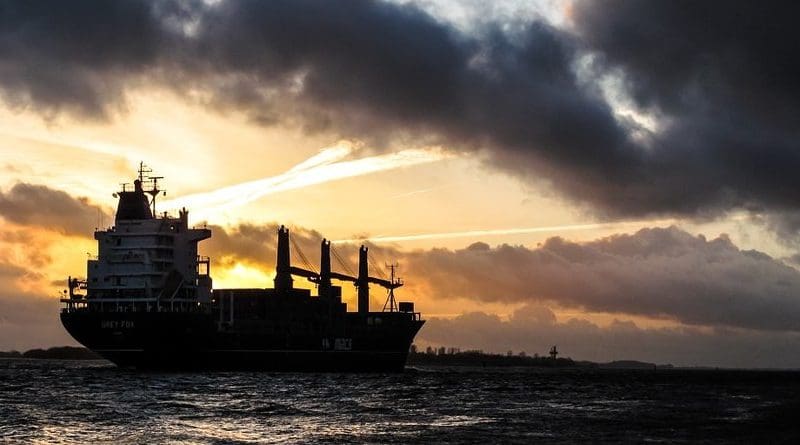Threats To Maritime Trade Beginning To Come True – OpEd
Three weeks ago I wrote an article ‘Brewing turmoil in Pakistan’s backyard’ and the concluding remarks were, “The fact remains that none of the country (United States or Iran) wants to get the blame for initiating a conflict, but it doesn’t mean that the threat of eminent war is not there. There is a fear that miscalculation or misunderstanding can trigger confrontation and an outbreak of war. As the US expands its military presence in the region, the risk of beginning an accidental war rises further.”
The apprehension came true when two oil tankers were attacked and left adrift in the Gulf of Oman. Washington was prompt in accusing Tehran of being behind a similar incident on May 12 when four tankers were attacked in the same area, a vital oil shipping route. Russia was quick to urge caution, saying no one should rush to conclusions about Thursday’s incident or use it to put pressure on Tehran, which has denied the US accusations. There were no immediate statements apportioning blame after Thursday’s incidents, nor any claims of responsibility.
The blasts detonated far from the bustling megacities of Asia, but the attacks on two tankers in the strategic Strait of Hormuz hits at the heart of the region’s oil import-dependent economies. While the violence only directly jolted two countries in the region one of the targeted ships was operated by a Tokyo-based company, a nearby South Korean-operated vessel helped rescue sailors it will unnerve major economies throughout Asia.
Subsequently, officials, analysts and media commentators highlighted the importance of the Strait of Hormuz for Asia, calling it a crucial lifeline. There was deep interest in more details about the still-sketchy attack and what the United States and Iran would do in the aftermath. Whether Asia shrugs it off, as some analysts predict, or its economies shudder as a result, the attack highlights the widespread worries over an extreme reliance on a single strip of water for the oil that fuels much of the region’s shared progress.
Japan, South Korea and China don’t have enough oil, but the Middle East does, and much of it flows through the narrow Strait of Hormuz. This makes Asia vulnerable to supply disruptions from US-Iran tensions or violence in the strait. The attack came months after Iran threatened to shut down the strait to retaliate against US economic sanctions, which tightened in April when the Trump administration decided to end sanctions exemptions for the five biggest importers of Iranian oil, which included China and US allies South Korea and Japan.
Japan is the world’s fourth-largest consumer of oil after the United States, China and India and relies on the Middle East for 80 per cent of its crude oil supply. The 2011 Fukushima nuclear disaster led to a dramatic reduction in Japanese nuclear power generation and increased imports of natural gas, crude oil, fuel oil and coal. In an effort to comply with Washington, Japan says it no longer imports oil from Iran. Officials also say Japanese oil companies are abiding by the embargo because they don’t want to be sanctioned. But Japan still gets oil from other Middle East nations using the Strait of Hormuz for transport.
South Korea, the world’s fifth largest importer of crude oil, also depends on the Middle East for the vast majority of its supplies. Last month, South Korea halted its Iranian oil imports as its waivers from US sanctions on Teheran expired, and it has reportedly tried to increase oil imports from other countries such as Qatar and the United States.
China, the world’s largest importer of Iranian oil, understands its growth model is vulnerable to a lack of energy sovereignty and has been working over the last several years to diversify its suppliers. That includes looking to Southeast Asia and, increasingly, some oil-producing nations in Africa.
Asia and the Middle East are linked by a flow of oil, much of it coming by sea and dependent on the Strait of Hormuz, which is the passage between the Persian Gulf and the Gulf of Oman. Iran threatened to close the strait in April. For both Japan and South Korea, there is extreme political unease to go along with the economic worries stirred by the violence in the strait. Both nations want to nurture their relationship with Washington, a major trading partner and military protector. But they also need to keep their economies humming, which requires an easing of tension between Washington and Tehran.
Japan’s conservative Prime Minister, Shinzo Abe, was in Tehran, looking to do just that, when the attack happened. His limitations in settling the simmering animosity were highlighted by both the timing of the attack and a comment by Iranian Supreme Leader Ayatollah Ali Khamenei, who told Abe that he had nothing to say to Trump.
In Japan, the world’s third largest economy, the tanker attack was front-page news. The Nikkei newspaper, Japan’s major business daily, said that if mines are planted in the Strait of Hormuz, “oil trade will be paralyzed.” The Tokyo Shimbun newspaper called the Strait of Hormuz Japan’s “lifeline.”
Analysts believe it’s highly unlikely that Iran would follow through on its threat to close the strait. That’s because a closure could also disrupt Iran’s exports to China, which has been working with Russia to build pipelines and other infrastructure that would transport oil and gas into China.

